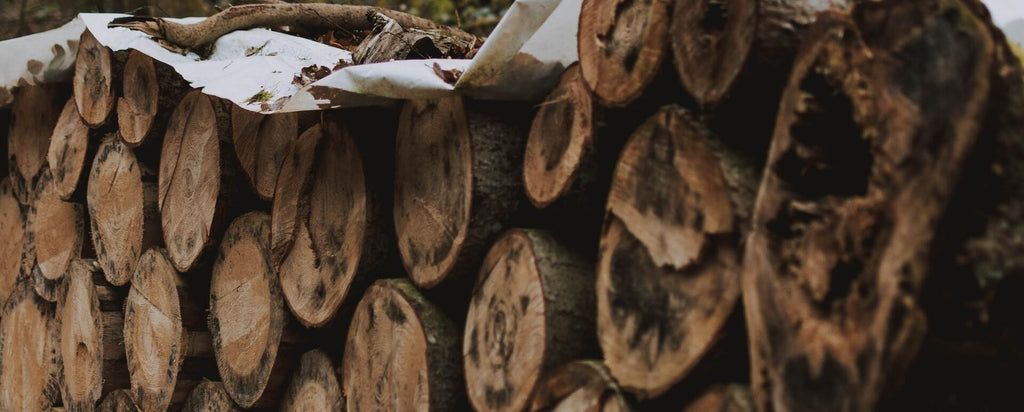Your Cart is Empty
What is Ecovero?
Wondering what Ecovero fabric is? Well let me answer that for you.
Ecovero is one of the most sustainable man made fabrics out there. The production process is designed to be environmentally friendly, helping cut water and carbon emissions whilst not releasing any waste into the environment. This makes it much better than many alternative fabrics like cotton, polyester or traditional viscose.
But we’re jumping ahead a little. Let’s start from the top, what is Ecovero?

What is Ecovero?
Ecovero is a brand name for a sustainably made viscose fabric manufactured by Austrian company Lenzing AG.
Viscose, which is also known as rayon, is a type of fabric made from wood pulp. Most viscose production is harmful for the environment, which we have written about here.
Lenzing AG have managed to make a sustainable viscose that reduces CO2 emissions and cuts water consumption.
Ecovero is commonly used in the production of clothing and homeware, such as T-shirts, dresses, and skirts, along with home textiles like curtains and bedding.
It feels soft on your skin, and smooth to touch. It is breathable and able to moisture wick, perfect for leisure wear, intimate items or clothes for a hot summer day.
The next question you might be asking, is Ecovero sustainable?
Is Ecovero sustainable?
Simply put, yes. Ecovero is one of the most sustainable viscose fabrics. Here are the top 5 reasons why Ecovero is so sustainable and good for the environment:
- Made from sustainably sourced wood pulp. Over 99% of wood used in Ecovero fabric is certified by the Forest Stewardship Council (FSC) or Programme for the Endorsement of Forest Certification (PEFC).
- Ecovero uses less water vs. cotton or regular viscose. To make a 150g T-shirt, Ecovero uses 12 litres less water than generic viscose and 210L less water than cotton.
- Ecovero produces less CO2. Compared to regular viscose, Ecovero produces 50% less CO2 as confirmed by Higgs MSI. This means cleaner air for you and me.
- Ecovero guarantees a transparent supply chain. Ecovero’s fibre identification system means you can trace fibres from source to end garment.
- Ecovero is biodegradable. As it’s made from natural cellulose fibres, Ecovero can decompose. Less fabric waste in landfills.
This makes Ecovero good for the planet and has earned the manufacturer Lenzing the EU Ecolabel certification, an award to products with high environmental standards.

What is ecovero made of?
Ecovero is made using sustainable wood, harvested from FSC (Forest Stewardship Council) or PEFC (Program for Endorsement of Forest Certification Schemes) certified woodlands.
More than 60% of this wood comes from Austria and Bavaria, which is near to where Austrian manufacturer Lenzing AG is based. This means wood doesn’t have to get shipped across the globe, lowering transport emissions.
This sustainably harvested wood pulp is first dissolved in a bath using chemicals such as carbon disulfide, sulfuric acid, ammonia or caustic soda. This breaks the wood down into a cellulose pulp.
Pulp is then pushed through a spinneret, a shower head like object. Long strings of fibre are formed, which can be woven into the fabric we wear.
The result is that Ecovero is of natural origin, but is still considered a semi-synthetic material.
Ecovero’s sustainably harvested wood and eco-friendly manufacturing facilities means that 50% less CO2 and water is used compared to regular viscose.
Water is also cleaned before being released back into the environment. Sadly this cannot be said for many standard viscose manufacturing facilities around the globe, as regular viscose is incredibly bad for the environment.

Is Ecovero better than cotton?
Yes, Ecovero is better than regular cotton.
The main advantages of Ecovero compared to cotton are the low water requirements. Ecovero also uses less chemicals to grow than cotton, helping preserve natural ecosystems.
Cotton is an incredibly thirsty crop. In comparison to cotton, Ecovero uses 210L less water to make a 150g T-Shirt.
To produce 1kg of cotton takes between 10,000L to 20,000L of water. It’s also often grown in drought prone areas, placing pressure on local populations.
Another reason Ecovero is better than cotton is because it uses fewer chemicals to grow. Cotton is very chemically dependent. It’s responsible for using 5.7% of all global pesticides and 16.1% of insecticides, despite covering just 2.4% of agricultural land.
Ecovero in comparison is made from responsibly grown forests near to Lenzing AG’s manufacturing facilities. These natural forests require no artificial irrigation or chemicals. Ecovero as a result has a lower carbon footprint than cotton.
Want to read more?
Have you ever bought Ecovero clothes before? Let us and other readers know what it’s like below.
If you want to read more, the following articles might be useful.
Leave a comment
Comments will be approved before showing up.